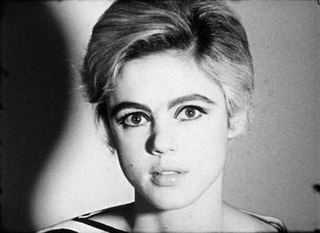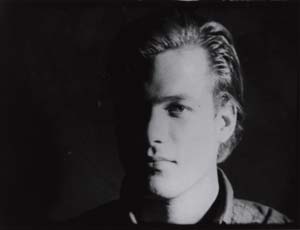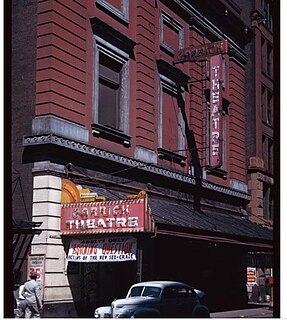Related Research Articles

Edith Minturn Sedgwick Post was an American actress and fashion model, known for being one of Andy Warhol's superstars. Sedgwick became known as "The Girl of the Year" in 1965 after starring in several of Warhol's short films in the 1960s. She was dubbed an "It Girl", while Vogue magazine also named her a "Youthquaker".
Warhol superstars were a clique of New York City personalities promoted by the pop artist Andy Warhol during the 1960s and early 1970s. These personalities appeared in Warhol's artworks and accompanied him in his social life, epitomizing his famous dictum, "In the future everyone will be famous for fifteen minutes". Warhol would simply film them, and declare them "superstars".
Poor Little Rich Girl is a 1965 underground film by Andy Warhol starring Edie Sedgwick. Poor Little Rich Girl was conceived as the first film in part of a series featuring Sedgwick called The Poor Little Rich Girl Saga. The saga was to include other Warhol films: Restaurant, Face, and Afternoon.

Factory Girl is a 2006 American biographical film directed by George Hickenlooper. It is based on the rapid rise and fall of 1960s underground film star and socialite Edie Sedgwick, known for her association with the artist Andy Warhol.

Chelsea Girls is a 1966 American experimental underground film directed by Andy Warhol and Paul Morrissey. The film was Warhol's first major commercial success after a long line of avant-garde art films. It was shot at the Hotel Chelsea and other locations in New York City, and follows the lives of several of the young women living there, and stars many of Warhol's superstars. The film is presented in a split screen, accompanied by alternating soundtracks attached to each scene and an alternation between black-and-white and color photography. The original cut runs at just over three hours long.

Bibbe Hansen is an American performance artist, musician and actress.

The Screen Tests are a series of short, silent, black-and-white film portraits by Andy Warhol, made between 1964 and 1966, generally showing their subjects from the neck up against plain backdrops. The Screen Tests, of which 472 survive, depict a wide range of figures, many of them part of the mid-1960s downtown New York cultural scene. Under Warhol’s direction, subjects of the Screen Tests attempted to sit motionless for around three minutes while being filmed, with the resulting movies projected in slow motion. The films represent a new kind of portraiture—a slowly moving, nearly still image of a person. Warhol's Screen Tests connect on one hand with the artist's other work in film, which emphasized stillness and duration (for example, Sleep and Empire, and on the other hand with his focus after the mid-1960s on documenting his celebrity milieu in paintings and other works.

Vinyl is a 1965 American black-and-white film directed by Andy Warhol at The Factory. It is an early adaptation of Anthony Burgess' 1962 novel A Clockwork Orange, starring Gerard Malanga, Edie Sedgwick, Ondine, and Tosh Carillo, and featuring such songs as "Nowhere to Run" by Martha and the Vandellas, "Tired of Waiting for You" by The Kinks, "The Last Time" by The Rolling Stones and "Shout" by The Isley Brothers.

a, A Novel is a 1968 book by the American artist Andy Warhol published by Grove Press. It is a nearly word-for-word transcription of tapes recorded by Warhol and Ondine over a two-year period in 1965–1967.

Paul Johnson, better known as Paul America, was an American actor who was a member of Andy Warhol's Superstars. He starred in one Warhol-directed film, My Hustler (1965), and also appeared in Edie Sedgwick's final film Ciao! Manhattan (1972).
Chuck Wein was an American promoter and manager of entertainment acts whose celebrity stemmed from his five-year (1964–1969) association with Andy Warhol and from his discovery of Edie Sedgwick who became Warhol superstar of 1965. He was also a film director.

Beauty No. 2 is a 1965 American avant-garde film by directed by Andy Warhol and starring Edie Sedgwick and Gino Piserchio. Chuck Wein also has a role in the film but never appears onscreen. Wein wrote the scenario and is also credited as assistant director.
Eugene "Gino" Piserchio was an American actor, composer and musician. Piserchio was noted for being an accomplished musician. He was one of the first musicians to master the Moog synthesizer.
Beauty No. 1 is a 1965 film by Andy Warhol starring Edie Sedgwick, Kip Stagg a.k.a.Bima Stagg, and Chuck Wein.
Four Stars is a 1967 avant-garde film by Andy Warhol, actually consisting of 25 hours of film. In typical Warhol fashion of the period, each reel of the film is 35 minutes long, or 1200 ft. in length, and is shot in sync-sound.

David Weisman was an American film producer, author, and graphic artist, most noted for his films Ciao! Manhattan and Kiss of the Spider Woman. He was the brother of film director Sam Weisman.
Kitchen is a 1966 feature-length underground film directed by Andy Warhol and Ronald Tavel, and starring Edie Sedgwick, Rene Ricard, Tavel, Roger Trudeau, David McCabe, Donald Lyons, and Electrah. The entire film takes place in the New York City kitchen of Bud Wirtschafter, the sound man.
The Andy Warhol Story is a 1966 underground film directed by Andy Warhol with cinematography by Paul Morrissey, and starring Edie Sedgwick and Rene Ricard.
Horse is a 1965 underground film directed by Andy Warhol, written by Ronald Tavel, and starring Edie Sedgwick, Gregory Battcock, Tosh Carillo, Ondine, Norman Glick, Daniel Cassidy Jr., and Larry Latrae (Latreille). Warhol himself makes a cameo appearance in the film.

The Garrick Cinema was a 199-seat movie house at 152 Bleecker Street in the Greenwich Village neighborhood of Lower Manhattan in New York City. Andy Warhol debuted many of his notable films in this building in the late 1960s. Frank Zappa and the Mothers of Invention played here nightly for 6 months in 1967.